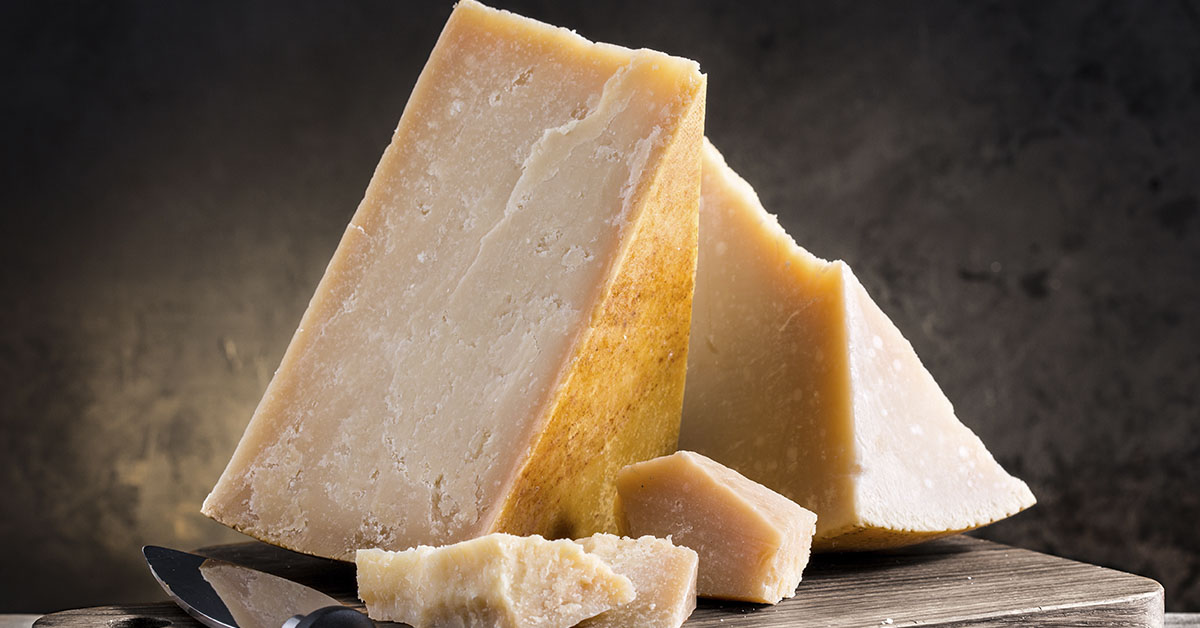Unlink vegans, who avoid all animal-derived food, many vegetarians eat eggs and dairy products. But although vegetarians could eat macaroni and cheese without any concerns, they may need to pass on the eggplant parmesan. Because a little-known fact about parmesan is causing outrage online, this hard cheese contains rennet, which comes from animal stomachs.
Parmesan Cheese is not Vegetarian-Friendly

Parmigiano Reggiano is made from milk combined with whey and rennet. And rennet is an enzyme that comes from the stomach lining of ruminant animals, usually from calves, lambs, or kids. This creates coagulation which separates the curds from the liquid. Slowly, the solids form into a ball, which then goes into a cheesecloth. A few days later, it goes into a salt bath to form the rind. Then the cheese ages for at least a year.
“Often when we talk about whether a cheese is vegetarian, or not, we are referring to the type of rennet used in making the cheese,” says Josh Windsor, caves manager at Murray’s Cheese. “Rennet is an enzyme that helps coagulate milk. This is the big step in cheese making that binds the proteins in milk together. There are a few different kinds of rennet that cheese makers can use, some of which are vegetarian and others that are not.” [1]
Read More: Wine and Cheese May Help Reduce Cognitive Decline
But the rennet part of the process is horrifying to many people online.

“I was today years old when I found out Parmesan cheese is made from baby cow’s stomach and I could go cry,” a Twitter user said. Another person commented, “That’s really gross. I don’t want another cheese in my life.” [2] Keep in mind Parmigiano Reggiano and parmesan are not precisely the same. Parmigiano Reggiano has a protected status in the European Union.
This means the cheese must uphold strict requirements for Parmigiano Reggiano to receive Italy’s official label of Denominazione d’ Origine Protetta (Protected Designation of Origin). Meanwhile, parmesan in the U.S. does not have the same level of strict quality control as in Europe. So although parmesan’s production is similar to Parmigiano Reggiano’s, certain details could change, creating a different flavor. However, this changed detail could be rennet. [3]
A Hard Cheese to Swallow

So don’t panic, vegetarians who love cheese. Although authentic Parmigiano Reggiano contains animal rennet, there are parmesan cheese versions that are safe for vegetarians. But be on guard for other cheeses with rennet, including Vacherin, Emmenthaler, Gruyère, Gorgonzola, Pecorino Romano, Manchego, Grana Padano, and Camembert. [4]
“When [rennet is] listed on a cheese label, it can be called several names: animal rennet, traditional rennet, calf rennet, and so on. Traditional rennet is found in most name-protected European cheeses (such as Parmigiano-Reggiano, Gruyère, Manchego) and is often preferred for making hard, longer aged cheese,” says Windsor.
Read More: Your Favorite Cheeses Ranked from Healthiest to Unhealthiest
Remember, these hard cheeses may have vegetarian-friendly versions that use vegetable rennet or microbial enzymes. [5]

Get into the habit of checking the labels on these cheeses. Plus, parmesan cheese with kosher or halal certifications is automatically vegetarian-friendly. As Windsor explains, “The oldest and most traditional is generally labeled vegetable rennet. These are enzymes extracted from plant sources. For example, the thistle rennet Tortas of the Iberian Peninsula use a rennet that comes from the cardoon thistle and produces a creamy, spoonable cheese. Modern vegetarian rennet, which is often labeled vegetarian or microbial rennet, is derived from various microbes. Some versions are the same chemical compounds as found in traditional rennet but are produced by bacteria or yeasts in a lab.”
So avoid ingredients like traditional rennet, animal rennet, kid rennet, or lamb rennet. Instead choose labels that say vegetable rennet, vegetarian rennet, vegetable rennet, thistle rennet, fermentation-produced rennet, or FPC Chymosin. But when the ingredient list just says “rennet” or “enzyme” Windsor has a good rule to go by. “In general, traditional cheese styles, European cheeses, hard cheeses, and cheeses aged more than six months are more likely to use animal rennet. A Wisconsin-produced mild cheddar is more likely to be vegetarian than an imported, 18-month-old Comté. Most soft cheeses are made with vegetarian rennet.”
Cheddar Safe than Sorry

Moreover, clothbound or bandage-wrapped cheddar cheese may not be vegetarian-friendly. But not because of rennet. Many common types of cheddar age in wax or sealed bags, so they don’t have a rind. They often come in the form of shreds, slices, and blocks. But another way to age cheddar is by wrapping it in a cheesecloth, which does create a rind. “This style of cheddar aging is much more labor-intensive, but produces a more dry, crumbly texture and complex flavor profile,” says Windsor.
This sounds all well and good — until it comes to the substance used to attach the cheesecloth to the cheese. Cheddar is often coated in fat, like butter. But sometimes it’s lard, which comes from pigs. “There is no requirement in the U.S. to list either on the label, so it can be very difficult to determine which is being used,” says Windsor. “Often this will require some internet sleuthing or access to an informed cheesemonger to assess.”
Read More: The Type Of Cheese That Has More Protein Than Cooked Meat And Fish
Sources
- “Are All Types of Cheese Suitable for a Vegetarian Diet?” Martha Stewart. Perri Ormont Blumber. February 7, 2022
- “Little-known fact about extremely popular cheese sparks controversy.” News.com.au. January 14, 2023
- “What’s the difference between Parmigiano Reggiano and parmesan? Why most “parmesan” cheese in the US is fake.” Insider. Kristin Montemarano. March 30, 2022
- “Parmesan isn’t vegetarian — and it’s not the only cheese non-meat eaters should avoid.” Business Insider. Amy Daire. June 2, 2017
- “Cheese.” Vegetarian Society.

